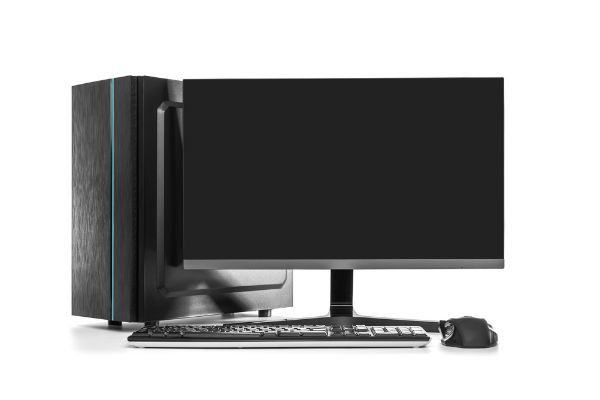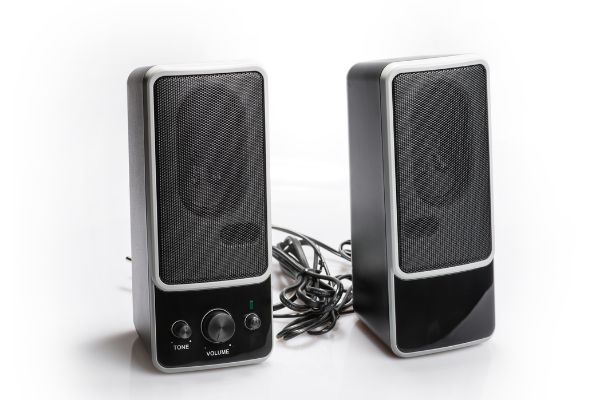Disclaimer: This post may contain affiliate links, meaning we get a small commission if you make a purchase through our links, at no cost to you. For more information, please visit our Disclaimer Page.
Personal or desktop computers have been used for both business and entertainment needs for decades. Over the years, the technology that they include has become more diverse and advanced. Simple word processors or games have become complex programs capable of rendering hundreds of functions in rich, vibrant detail.
The audio technology that might come with a computer is no exception to this kind of progress either. Many of the PCs you will find on the market today have some built-in speakers that should offer some kind of sound at a basic level. However, not all desktops have speakers that you can use natively.
Some monitors have speakers, and we will discuss their viability in our article below. We’ll also touch on whether speakers are an absolute must for any PC, how often speakers of any type might wear out, how to check for built-in speakers, and more.
Even with built-in speakers, some users may prefer external sound sources, and we can compare and contrast these two things as well.
Table of Contents
Do All PCs Have Built-In Speakers?
Many manufacturers consider audio to be just as basic a requirement as video. You wouldn’t use the desktop without some screen, even if that screen is not necessarily the native monitor that the tower came with when you got it.
In the same way, many people want at least some kind of audio feature to hear sound files that they might play on their computers.
To facilitate this, many models from different manufacturers will have speakers built into the monitors somehow.
The type and quality of the systems can vary from one brand or computer type to the next, but they are meant to give you some basic audio options when you can’t rely on anything external.
However, this isn’t necessarily true of all desktop computers. Some of them come with the expectation that you will hook up external speakers for audio purposes. This sort of thing is something you can find out by reading a computer’s specs.
If you don’t have any speakers yet, checking these things before purchasing a model you are interested in is a good idea. In this way, you’ll have some access to basic audio even before you get a set of speakers for yourself. You can also hook up headphones in order to achieve the same effect.
Do You Have To Have Speakers for a PC?
The answer here depends on what you plan to do with the personal computer of your choice. Technically, you may not need speakers for your PC.
It’ll either come with basic audio output from the monitor that will suffice for you, or you just won’t be doing anything that needs audio. In either case, you could get by with a PC incapable of rendering sound.
For example, if you plan to use only word processing programs or other things that require just text input, it is possible that you don’t need speakers for your desktop.
Similarly, you might surf the web to read text-based articles or watch videos with captions turned on.
For these kinds of activities, it is less important to have access to audio. There are even games you might play without using the sound. While audio does act as an enhancement to some of these activities, it may not be essential.
In short, it depends on your purposes and preferences as a user.
There are some occasions where your computer might want to use sound to notify you of particular things. Your motherboard should have its own speaker installed on it somewhere.
However, this speaker is not equivalent to anything you might use for sound in other circumstances.
It is designed to sound much like a microwave’s beeping when it wants to alert you that food or other items have finished heating up.
The motherboard may need to send beeps that alert you to critical updates on some of the computer’s hardware or functions, but it doesn’t stand in place of any traditional speaker.
Do Computer Speakers Wear Out?
Like any technology that relies on hardware and materials, computer speakers can wear out over time. However, most decent speakers can still last a really long time. They may even exceed the life of some of your computer’s other parts, or you might get a new machine before they wear out completely.
Here, you can even transfer your external speakers to a new device. When we talk about external speakers, they might use rubber, cloth, or foam when they flex on the surround
. In doing so, any of these materials can wear down over time, thus reducing the quality of the sound you hear.
There are also internal hardware components that run on electricity, and these can degrade as well.
Capacitors are one of the main things that might suffer from this, but even they should be able to last a few decades before needing some replacement.
Additionally, some vintage equipment can be restored to work like new and last another several years. Although speakers can wear out, there should be a long time between getting new ones and anything like that happening, particularly with components of decent quality.
How Do I Know if My PC Has a Built-In Speaker?
There are a couple of ways that you might check to see if your computer has built-in speakers. We will cover one of the easiest methods that you can use:
1. On your computer’s taskbar, look for an icon that resembles a speaker. If no such icon is present, you can go to the ‘Start’ menu to search that way.
2. In either case, go to ‘Sound settings’. It is here that you’ll find information on your speakers.
3. Under the ‘Output’ heading in this section, you should see a volume bar and a dropdown menu with something entered into it.
4. If you can see these things without any external speakers hooked up to your system, you should have some built-in speakers on the unit.
5. To test them, you can run an audio sample right in your settings menu already. Otherwise, you can also play an audio file from your computer to check the levels and quality.
Do PCs Need External Speakers?
If you aren’t into using any applications that need sound, you don’t necessarily need external speakers for your PC.
By the same token, you might be happy with whatever sound quality you get out of the built-in speakers on your system. In either case, investing in external speakers may not make sense.
However, it is also true that speakers of this type can lend a superior audio experience to many things you might do on your computer.
From listening to good music, to enjoying podcasts, or if you like to play the latest games with all the cool sound effects, external speakers can be a great boon. You may want to consider them for the best features that your computer can offer.
Conclusion
Speakers can enhance some of what you do on a PC. For some applications, they are entirely unnecessary. In other cases, you can get by with just the built-in speakers if you have to.
Even if you have no internal or external speakers, there is probably at least a notification speaker inside your computer and attached to your motherboard. It will sound crucial beeps or other noises when you must be aware of something that may be off with the PC’s components.


